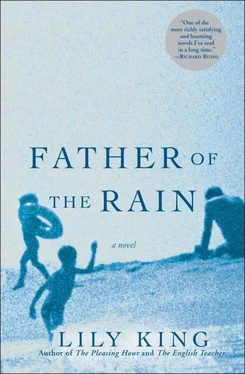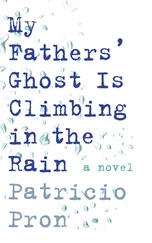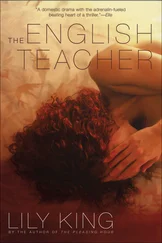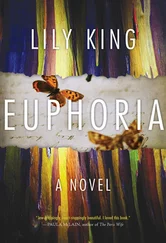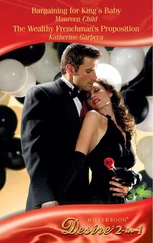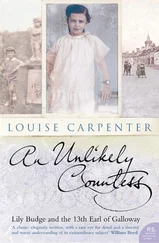“I know a lot of people I could try and save, and it would be futile for me to try. You know that.”
“This is my father , Jonathan.”
“Why was having a father never important to you until right now, right when we’re about to move in together?”
“Please don’t make this about us. It’s not about us.”
“What the hell is it about then? A week ago it was you and me and California, and now it’s this creepy town and a house built by the goddamn pilgrims and the bigot in residence.” He moves toward the steps, to his truck parked in the semicircle below. And then comes back. “Have you already called Oliver Raskin?”
“Yes.”
“And this is fine with him?”
“No.”
“What do you mean?”
“He’s giving the position to someone else.”
Somehow this is the thing that makes it real for him. I watch his eyes fill up. “Why are you sabotaging your life like this?”
Julie cried for my joy, and now he is crying for my loss. But I feel very little. All these words feel like mashed-up cardboard in my mouth. Mr. Emery, I see, has gone back inside.
He pinches the tears off the bridge of his nose and shakes his head. Then he laughs. “I can’t fucking believe this.”
“Jonathan.” He is on the other side of the terrace now. “Nothing has changed. I want to be with you. I want a life with you.”
“Not enough. You don’t want it enough.”
Can he not understand that this is not my choice ? Wouldn’t he do the same in my position? “What is wrong with you?” Anger snakes its way up. I don’t care what Mr. Emery hears. “Why can’t you get this? Why can’t you see that I don’t want to do this but that I have to do it? Yes, we had a plan. And now I’ve changed the plan slightly. Why can’t you adjust to that?”
“Slightly? You have not changed the plan slightly.” His voice is deep and bare. “You said you were going to work at Berkeley. I turned down Temple to be with you. And then instead of going to California, you came here. For two days, you said. And then you said, six days more. And now you’ve given up the job. Why should I trust that you will ever come to California?”
“I will, Jon.”
“I don’t believe you. You know, you can poke fun at me and my plans, but I have no options. If I want to eat, if I want a roof over my head, if someday I want to support a family, I have to have a plan. But there are no real consequences to your choices. Because you can just set a match to everything and your daddy will pay the bills. Grad school wasn’t just pretend for me.”
I’ve been on my own for eight years. I had a smaller stipend at Michigan than Jonathan. We were impoverished together. And now he’s twisting it all around. “You know what? Fuck you.”
“Fuck you, too.” I’ve never seen his mouth so tight, so mean.
He turns and drops down the stairs. Such a base ending. No better than an exchange between my father and Catherine.
I hear the truck start up, old and loud, and then the tires in the white gravel, and then silence as he reaches the pavement and is gone.
My father comes home from golf well after lunch. For a moment I think he is drunk. For a moment I see a mirage, a flashback to his drinking face, a slackness around the mouth, guilt in the yellow eyes. But as he gets closer and lifts his eyes and catches me watching from the kitchen, he changes back.
“We took no prisoners,” he says when he comes in. Then he looks at me closely. “What’s wrong?”
“Nothing.”
“You sure?”
“Yeah. Just tired.”
“Tell you what. Let’s go out to eat tonight. Anyplace you want.”
July passes.
In the mornings, if he doesn’t have a tennis or golf date, my father is full of industry around the house. He mows the grass on his tractor, cleans the pool and gives it its chemicals, or weeds the vegetable garden and goes to the dump. He likes to putter, to play with his tools in the garage, to walk back and forth from house to garage to shed to poolhouse with a purpose I can’t always discern. Occasionally he sits at his desk in the den with his reading glasses on and pays bills. He seems not to miss work in the least. I try to appear industrious too, though I am tired of industry. There is a thick caul of inertia around me. I walk the dogs to the beach, around to Littleneck Point, downtown to Neal’s store. I have begun an essay for lay readers about poverty and community in the Sierra Juarez, but I can’t find my bearings. I can’t get past the second page.
If I’m not careful, my father will have us on the tennis court most afternoons, so I have to come up with alternative activities. At the beginning of August, when my father has a yellow thirty-days-sober chip in his pocket, we drive a half-hour north to the Hook’s Island ferry, which is a glorified raft with flaking green railings and a few benches. Neither of us have ever been to Hook’s. We stand at the stern and my father looks out at the water, at the small white wake and the lobster pots and the handful of Whalers and sailboats moored close to shore, at the gulls who are squawking and diving into the same churning patch of water. The temperature drops as we pull farther from land. The ocean lies in strips of color: pale lavender, powder blue, cobalt, navy. My father looks but he does not comment on its beauty. It may be the first time he’s seen the open ocean all summer.
“My mother rented a house on an island one summer,” he says. “Reminds me of this.”
“I thought you always went to Boothbay.”
“That was after she married Hayes. He had that house in Maine.”
“Where was the island?”
“I’m not sure. Duck Island, I think it was called. Or Buck Island. I was only five or six.”
“Just you and her?”
“And Nora.”
The ferry jerks suddenly and we turn to the bow and the island is right there, all beach at its edges, a hillock in the middle. There are no houses. The whole thing is a wildlife reserve. The boat slides into its slot. The August heat returns.
The tourists hoist their backpacks and wait for the ferryman to unhook the chain. We let a family go ahead of us, a squat man, a willowy wife, two kids with mountain bikes. They smile at us. I can see they recognize that I am a daughter on a picnic with her father. I feel a small swell of pride. I smile back.
The best beach, said the woman who sold us our ferry tickets, is on the other side of the island, and we follow the path she told us about through the woods. It is dim and cool, the ground sandy.
“We played a game with a white handkerchief,” my father says. “It rained a lot. There was a little box for kindling by the fireplace and I hid the handkerchief there every time. Every time. Because it made my mother laugh. I think it was in Canada,” he says.
Prince Edward Island? Campobello? But I don’t want to waste a question on place. I stay silent. I wonder if what they speak about in AA is making him look back. I don’t pry about his meetings; I don’t know if he has a sponsor or if he is doing the steps.
“Nora got sick and stayed in bed. And my mother had to play with me.”
Through the break in the trees I can see the crests of the dunes, overlapping, blown to sharp peaks by the wind.
“All my life I heard about how smart my mother was, how she won some big prize at Smith and wrote articles about her travels in Egypt for The New York Times even before she’d graduated. But you know what I saw most of the time? A woman sitting in a chair staring at nothing. Even before my father died. Maybe you’d hear her complain that the steak was overdone or her glass had spots or that I was making too much noise. But that was about it.”
Читать дальше
